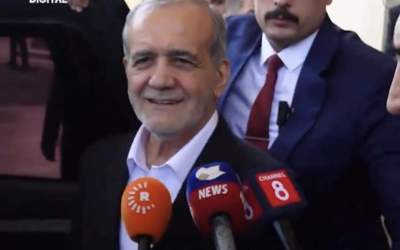Wednesday 13 February 2019 - 16:05
Story Code : 338275
Trump tweeted a photo of Iranian protest. he didnít ask the journalist who took it
Now sheís tangling with President Trump, who used a photograph she shot without permission for his own political purposes.
On the 40th anniversary of the Islamic Revolution, celebrated on Monday, Mr. Trump tweeted an iconic image taken by Ms. Moayeri. The image ó taken under dangerous circumstances ó shows an unidentified protester in Tehran, her left fist raised while surrounded by smoke, during demonstrations in 2017.
Mr. Trump took aim at Iranís leaders, who he, Secretary of State Mike Pompeo and National Security Adviser John R. Bolton all indirectly say must be changed.
ď40 years of corruption. 40 years of repression. 40 years of terror. The regime in Iran has produced only #40YearsofFailure. The long-suffering Iranian people deserve a much brighter future,Ē the president said in the Twitter post. Mr. Trump also posted the message in Persian, using the same image.
When Ms. Moayeri saw the post, she said, something snapped.
ďI felt cheated and abused, it causes me great sorrow to see the man who is inflicting so much pain upon me and my compatriots to use my image for his own agenda,Ē she said. ďI did not take this risk to have someone using it to pressure us Iranians even further.Ē
Trump administration officials in Washington did not immediately respond to emailed requests for comment on Ms. Moayeriís criticism.
The day she went out to photograph the image, Dec. 30, 2017, many places in the country were convulsed by protests over worsening economic conditions. Protesters also shouted slogans against the government and Iranís Islamic leaders.
When Ms. Moayeri got word of protests at Tehran University, she found students and riot police throwing stones at each other. Despite her fear of arrest, she started snapping photographs.
A stone hit her leg and some students blasted fire extinguishers, filling the air with billowy white fumes that resembled tear-gas smoke, she recalled, as the protests spilled outside the universityís gates.
ďSuddenly this young woman appeared through the smoke, covering her face with her head scarf and flashing a victory sign, I snapped some images,Ē she said. ďI never figured out who she was. Only when I came home I saw the picture had power.Ē
Thousands were arrested, 25 people died, the authorities tried to control the news and Ms. Moayeri possessed an image that had captured it all. As a freelancer who had worked in Sudan, Somalia, Pakistan, Iraq and elsewhere, she had many places to sell the picture, but also knew that if her name were published she might get into trouble with the authorities.
She ended up selling the image to Iran-based photographers for The Associated Press and Agence France-Presse. It quickly spread via social media as the symbol of the protests in Iran. There was no contract, and Ms. Moayeri said she still owned the rights to the image.
After six months she decided she had waited long enough to take public credit for the image. Ms. Moayeri sent it to the annual Iranian Photojournalists Association and won first prize. She did not get in trouble.
She provided The New York Times with the sequence and original pictures taken that day.
The sequence of photographs provided by Ms. Moayeri.
ďTaking pictures that tell the truth is the job of all photojournalists,Ē she said.
When Mr. Pompeo used the image last July ahead of a meeting with Iranians living in the United States who oppose the Islamic republic and its leaders, Ms. Moayeri said she had been upset, ďbut thought, ĎO.K., whatever.íĒ
Sign up for The Interpreter
Subscribe for original insights, commentary and discussions on the major news stories of the week, from columnists Max Fisher and Amanda Taub.
But she lost her temper when President Trump posted the image on Monday. ďHis sanctions are devastating our lives. Our money became worthless. People are becoming poor. Because of his travel ban, many Iranians cannot visit their family members in the United States. My father lives there and I canít go either,Ē she said. ďI just donít want to be any part of his agenda against Iran.Ē
She wrote a statement on her Instagram page, distancing herself from the use of the image by Mr. Trump. ďItís not as if I can sue the president of the United States as an Iranian, so I guess this is all I can do,Ē she said.
# Tags










